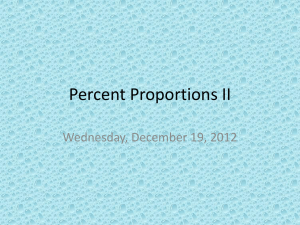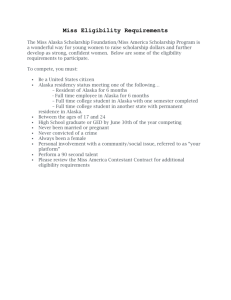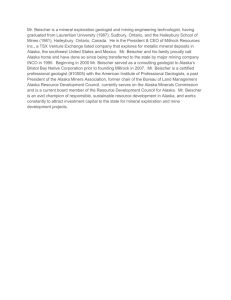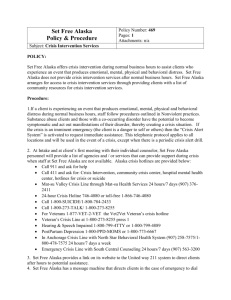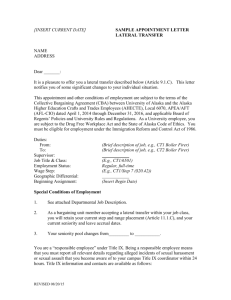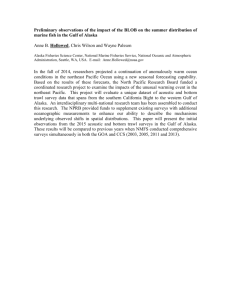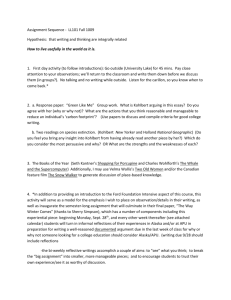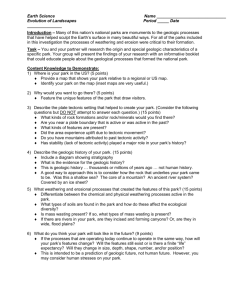Tentative Class Schedule
advertisement
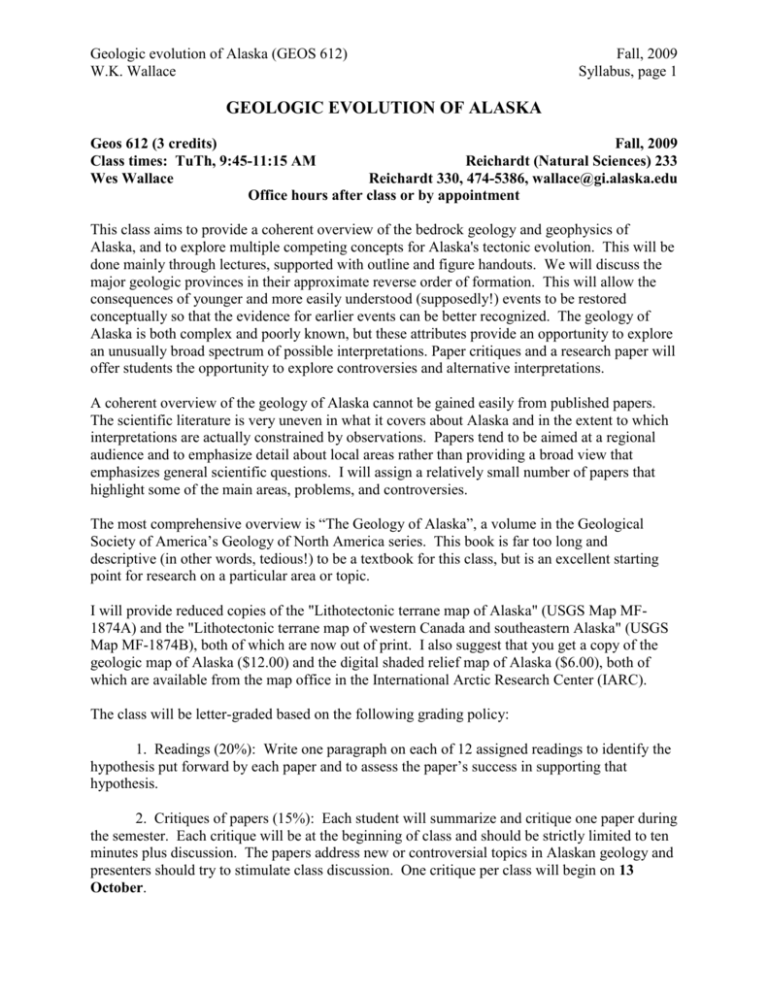
Geologic evolution of Alaska (GEOS 612) W.K. Wallace Fall, 2009 Syllabus, page 1 GEOLOGIC EVOLUTION OF ALASKA Geos 612 (3 credits) Fall, 2009 Class times: TuTh, 9:45-11:15 AM Reichardt (Natural Sciences) 233 Wes Wallace Reichardt 330, 474-5386, wallace@gi.alaska.edu Office hours after class or by appointment This class aims to provide a coherent overview of the bedrock geology and geophysics of Alaska, and to explore multiple competing concepts for Alaska's tectonic evolution. This will be done mainly through lectures, supported with outline and figure handouts. We will discuss the major geologic provinces in their approximate reverse order of formation. This will allow the consequences of younger and more easily understood (supposedly!) events to be restored conceptually so that the evidence for earlier events can be better recognized. The geology of Alaska is both complex and poorly known, but these attributes provide an opportunity to explore an unusually broad spectrum of possible interpretations. Paper critiques and a research paper will offer students the opportunity to explore controversies and alternative interpretations. A coherent overview of the geology of Alaska cannot be gained easily from published papers. The scientific literature is very uneven in what it covers about Alaska and in the extent to which interpretations are actually constrained by observations. Papers tend to be aimed at a regional audience and to emphasize detail about local areas rather than providing a broad view that emphasizes general scientific questions. I will assign a relatively small number of papers that highlight some of the main areas, problems, and controversies. The most comprehensive overview is “The Geology of Alaska”, a volume in the Geological Society of America’s Geology of North America series. This book is far too long and descriptive (in other words, tedious!) to be a textbook for this class, but is an excellent starting point for research on a particular area or topic. I will provide reduced copies of the "Lithotectonic terrane map of Alaska" (USGS Map MF1874A) and the "Lithotectonic terrane map of western Canada and southeastern Alaska" (USGS Map MF-1874B), both of which are now out of print. I also suggest that you get a copy of the geologic map of Alaska ($12.00) and the digital shaded relief map of Alaska ($6.00), both of which are available from the map office in the International Arctic Research Center (IARC). The class will be letter-graded based on the following grading policy: 1. Readings (20%): Write one paragraph on each of 12 assigned readings to identify the hypothesis put forward by each paper and to assess the paper’s success in supporting that hypothesis. 2. Critiques of papers (15%): Each student will summarize and critique one paper during the semester. Each critique will be at the beginning of class and should be strictly limited to ten minutes plus discussion. The papers address new or controversial topics in Alaskan geology and presenters should try to stimulate class discussion. One critique per class will begin on 13 October. Geologic evolution of Alaska (GEOS 612) W.K. Wallace Fall, 2009 Syllabus, page 2 3. Research paper (65%): Preparation and presentation of a research paper will allow you the opportunity to explore a subject or area in more detail than is covered in class, and to derive your own testable hypotheses. The paper should not be primarily descriptive or simply restate what others have said. Instead, it should identify a significant unresolved problem and present and evaluate multiple, testable hypotheses that fit the available data. The paper should then identify the hypothesis that is best supported by the existing data and suggest a practical approach to test that hypothesis further. I will provide a list of possible topics, but you may suggest other topics that you consider appropriate. The paper will be due mid-semester so that I have time to review and return it to you for revision prior to final submission and an oral presentation. The research paper will include three parts, each of which contributes separately to your grade: a. Topic proposal (5%): This will be a one-page summary of your proposed topic to give me the opportunity to provide you with feedback on your topic and approach before you begin writing. Due by 1 October. b. Written paper (45%): This will be where you present your data and analysis in detail. However, it will be subject to strict page limitations like published papers. I will provide you with guidelines for format and content. As with published papers, you will submit the paper, then revise it based on reviewer comments. Paper due on 12 November, revised paper due on 10 December. c. Presentation (15%): At the end of the semester, you will present the subject of your paper in a GSA-style abstract and talk. Your grade will be based your success in achieving a clear, concise, and informative abstract, a clear and logical sequence of statements leading to a conclusion in the oral presentation, a convincing argument in support of your preferred hypothesis, and supporting graphics that are clear and appropriate. Presentations on 8 and 10 December. Geologic evolution of Alaska (GEOS 612) W.K. Wallace Fall, 2009 Syllabus, page 3 Tentative Class Schedule 1. 3 September Physiography and geologic overview of Alaska 2. 8 September Terrane concept and global tectonic setting 3. 10 September Evolution of the northeastern Pacific 4. 15 September Plate boundaries, seismicity, and neotectonics 5. 17 September Aleutian trench and arc 6. 22 September Yakutat block 7. 24 September Prince William and Chugach terranes 8. 29 September Wrangellia and Peninsular terranes 9. 1 October Terranes and basins of southwestern Alaska and the central Alaska Range 1-page paper proposal due 10. 6 October Bering Sea shelf, Aleutian basin, and ancestral Aleutian arc 11. 8 October Terranes and accretion in southeastern Alaska and western British Columbia 12. 13 October Magmatic belts of southern Alaska and western Canada Begin paper critiques 13. 15 October Models for the tectonic evolution of southern Alaska 14. 20 October Models for the tectonic evolution of southern Alaska (continued) 15. 22 October Yukon-Tanana terrane 16. 27 October Paleozoic continental margin of northwestern Canada 17. 29 October Displaced continental terranes of interior Alaska 18. 3 November Yukon-Koyukuk basin and its margins 19. 5 November Brooks Range Geologic evolution of Alaska (GEOS 612) W.K. Wallace 20. 10 November Brooks Range (continued) 21. 12 November Brooks Range foothills and Colville basin Fall, 2009 Syllabus, page 4 Papers due 22. 17 November Northeastern Brooks Range, North Slope, and northern Alaska continental margin 23. 19 November Arctic Ocean basin 24. 24 November Seward Peninsula and Chukotka 26 November No class: Thanksgiving break 25. 1 December Russian Far East 26. 3 December Models for the tectonic evolution of northern Alaska and Russian Far East 27. 8 December Student presentations 28. 10 December Student presentations Revised papers due
